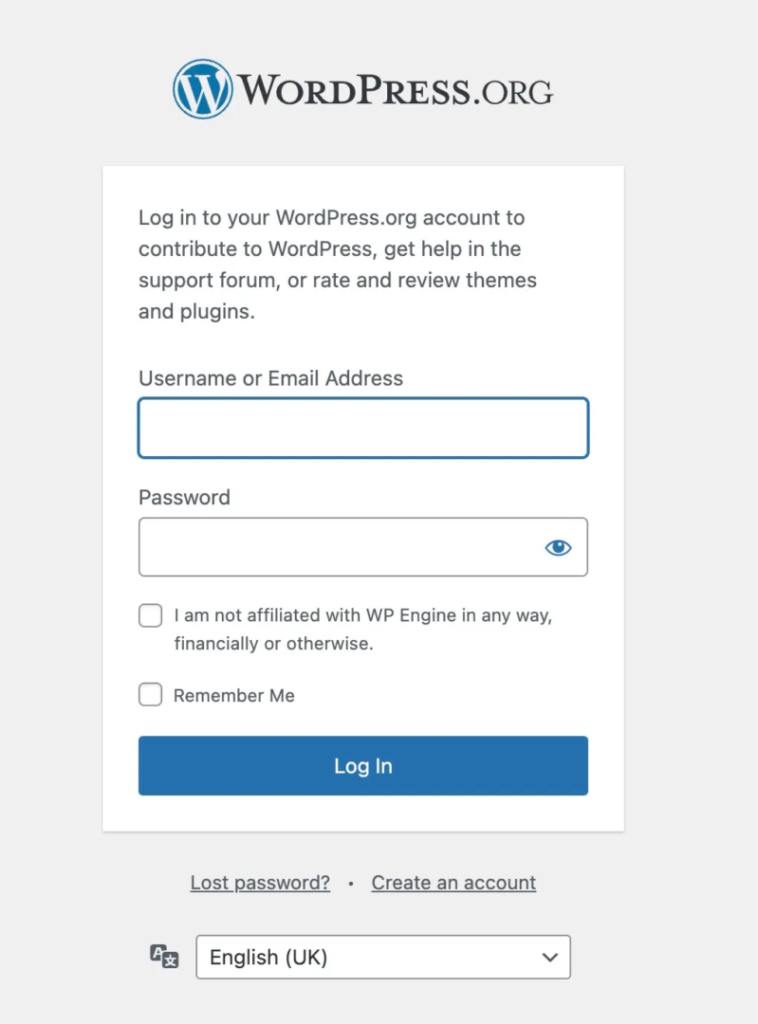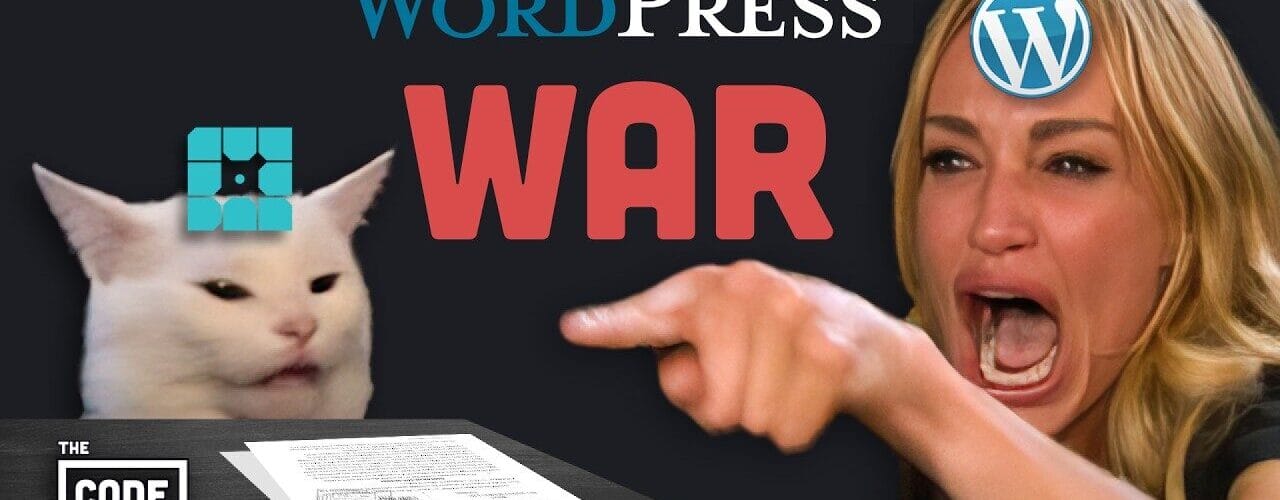WordPress, for those unfamiliar, is a free, open-source building platform allowing users to create and customize websites, and publish blogs and other forms of content, along with providing many third-party sources to create plugins that can be easily installed to enhance the capabilities of the website.
WordPress is a whale, occupying roughly 63% of all websites online (though some sources say the number is actually around 43%).

If you haven’t heard about this issue it’s a bit complicated, but Syed Balkhi for WP Beginner, a community and network dedicated to helping users navigate WordPress, and tech YouTube channel Fireship provide a summary of the issues facing the WordPress community:
There is a lawsuit between two WordPress companies (WP Engine and Automattic) around a trademark dispute. Due to their influence, there have been escalations that have led to a lot of negative PR for the WordPress ecosystem. The vast majority of WordPress sites are NOT impacted by this at all.
This whole thing started because two big companies in the WordPress industry are in a legal battle over a trademark dispute.
Automattic is a company started by WordPress co-founder, Matt Mullenweg. They are the creators of WooCommerce, WordPress.com hosting service, Jetpack plugin, and more.
WP Engine is a managed WordPress hosting company owned by a large private equity firm Silver Lake.
Automattic has the exclusive commercial rights to use the “WordPress” trademark. They asked WP Engine to negotiate a licensing agreement which involved either payments to Automattic OR increased contributions to the free open source WordPress project.
Because the parties failed to come to an agreement, Matt publicized the dispute at the annual WordCamp US conference, where he claimed that WP Engine, despite being a $400M+ revenue company, does not give back enough to the free open source WordPress project.
As things escalated, both companies sent each other a formal legal Cease and Desist (C&D) letter. Due to the legal threats, Matt, as co-founder of WordPress, banned WP Engine from accessing WordPress.org servers.
WP Engine is free to offer their hacked up, bastardized simulacra of WordPress’s GPL code to their customers, and they can experience WordPress as WP Engine envisions it, with them getting all of the profits and providing all of the services.
Mullenweg wrote in his piece (not quoted in the WP Beginner article).
This meant that any customer with websites on WP Engine hosting were no longer able to receive updates from WordPress.org servers.
The ban was later reverted temporarily to protect users and allow WP Engine to build their own update servers. Since WordPress is open source, the WP Engine team was able to build their own updater to ensure users on their hosting platform can get software updates.
The server block officially went back into effect on October 1st. Shortly after, WP Engine filed a federal lawsuit against Automattic and Matt Mullenweg.
Due to the escalation, WP Engine’s team were banned from accessing their WordPress.org accounts. This means the WP Engine team is no longer able to release updates to their WordPress plugins from the official WordPress.org servers.
One of the plugins owned by WP Engine is Advanced Custom Fields (ACF) which is popular among developers and used by over 2 million websites. To ensure security updates are available to all users, the WordPress.org team forked the ACF plugin, renamed it to Secure Custom Fields (SCF), and took over the original ACF plugin directory page without the consent of WP Engine. The reasons given for this were to maintain and provide updates to users who were unaware of the drama.
This decision was not well received and garnered a lot of negative comments from developers, influencers, and press outlets.
At the time of writing this post, all other WP Engine plugins are still available for download on the WordPress.org plugin directory, however, the WP Engine team is still banned, so they are not able to use WordPress.org servers to issue updates.
In summary, at the root of this WordPress drama is a heated legal trademark dispute between WP Engine hosting company, Automattic, and Matt Mullenweg (co-founder of WordPress).
Since there is a federal lawsuit filed by WP Engine against Automattic, I believe only the courts can decide the outcome unless the parties come to an amicable resolution outside of the courts. The official WordPress Twitter account tweeted that the situation could be resolved under the following conditions:
To add to this, on October 9th, ‘web app development framework Ruby on Rails creator David Heinemeier Hansson opined that Automattic is violating principals of open source software by asking WP Engine to pay 8% of its revenues,’ Tech Crunch reported
Automattic is completely out of line, and the potential damage to the open source world extends far beyond the WordPress. Don’t let the drama or its characters distract you from that threat.
He said in a blog post.
Tech Crunched added: ‘On the same day, Mullenweg added a new checkbox to the WordPress.org contributor login, asking people to verify that they are not associated with WP Engine in any way. This move was criticized by the contributor community. Some contributors said that they were banned from the community Slack for opposing the move.’

WP Engine responded by saying that its customers, agencies, users, and its community are not the company’s associates.

Fortunately, WordPress is not going anywhere and this issue will not effect the vast majority of WordPress users, but the contentions definitely caused a lot of concern within the community, with some wondering if WordPress will be able to operate in its current form for much longer.
Jono Alderson, an independent technical SEO consultant, who was banned from for sharing his thoughts on Slack and was banned because of it, said in a statement to Fast Company, “Matt’s recent actions have unequivocally harmed WordPress, as well as the broader open-source ecosystem.”
People are afraid to speak up, for fear of retribution. Everyone’s worried that they might be the next to be banned, attacked, or railroaded—and there’s no court of appeal, no public recourse, and no end in sight.
Alderson added
Fast Company noted a ‘Reddit thread where a majority of posters say they’re not currently affected by the dispute with WP Engine—but are worried about what’s to come if the quarrel continues.’ “He’s either not listening, or just doesn’t care,” Alderson added. “And there’s nothing that anyone can do about that.”
AUTHOR COMMENTARY
The WinePress operates with WordPress, so this definitely peaked my interest when I learned of this debacle.
Proverbs 18:19 A brother offended is harder to be won than a strong city: and their contentions are like the bars of a castle.
I’ve talked about this in previous reports that private equity is purely parasitical: they provide nothing of value, they don’t add to the economy or have a track record of improving or sustaining a company, but continues to suck and siphon the company dry of equity leading to the company’s closure. Toys R’ Us and Red Lobster are two prime recent examples of this.
So on one hand it is good that Mullenweg is resisting private equity, but the way he is going about it is cause for some concern; and this may open the floodgates for more problems down the road and affect more users if new contentions arise, stirred up by the precedent this has set among the tech and blogging community.
[7] Who goeth a warfare any time at his own charges? who planteth a vineyard, and eateth not of the fruit thereof? or who feedeth a flock, and eateth not of the milk of the flock? [8] Say I these things as a man? or saith not the law the same also? [9] For it is written in the law of Moses, Thou shalt not muzzle the mouth of the ox that treadeth out the corn. Doth God take care for oxen? [10] Or saith he it altogether for our sakes? For our sakes, no doubt, this is written: that he that ploweth should plow in hope; and that he that thresheth in hope should be partaker of his hope. (1 Corinthians 9:7-10).
The WinePress needs your support! If God has laid it on your heart to want to contribute, please prayerfully consider donating to this ministry. If you cannot gift a monetary donation, then please donate your fervent prayers to keep this ministry going! Thank you and may God bless you.








This is similar situation with substack.com, rumble.com, odysee.com, etc. The censorship is going to be at maximum that nobody will know the truth. Corporations own these publications can tell their publishers what to say and what not to say to the public. They are no different from youtube, Twitter or X, Google for censorship and shadow banning.
What’s going on with Substack? Are they scrubbing posts there too?
Jacob do know the scriptures for our 3 God given Rights? Can you point me in the right direction. Thank you
Though I’m not in Substack, I checked to see what’s going on, I haven’t found anything yet, just this past issue about the “No Virus Theory” psyop the site allegedly ran in 2022.
So far my Rumble seems to be okay. Going into it, I wasn’t expecting the videos to get many views anyway. There’s a lot of ad interruptions lately though. The platform’s trying to make money to keep running, as I see it. If you watch videos live, no ads.
With X/Twitter, my posts don’t get much traffic, to be expected also. I’ve been posting WP articles on there.
Jacob, is there a noticeable increase in the number of visits on the WinePress? (Funny article picture.)
Nothing too noticeable, but getting accurate stats are very difficult to get. VPN’s and browsers are blocking the trackers.
Got it. I am getting one or two clicks on some of the WP articles on X. But the site is definitely shadowbanning the articles and videos with conman Musk in it.
My browser privacy is set to “strict” with cookies sometimes, now it’s on “standard”; “strict” seems to load pages faster. Not sure if this is relevant to WP stats.